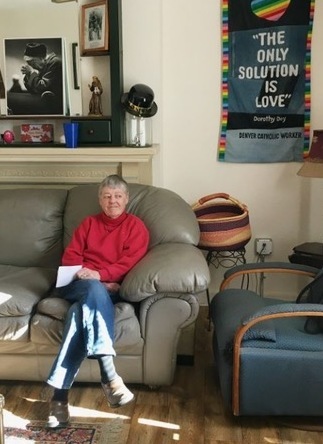GSR Reprint: Q & A with Sr. Anna Koop
Posted on June 1, 2020, by Loretto Community
Editor’s note: When the Global Sisters Report produced a series on women religious working with those who are homeless or living in substandard housing, they could not have chosen a better person to interview than Anna Koop. Anna has been working for decent, affordable housing for all since the ‘70s, opening the Denver Catholic Worker House in 1978. Her compassion and prodigious knowledge are evident in the interview, which appeared in GSR on April 21. Thank you to Georgia Perry for her insightful conversation with Anna and her photo of Anna. Thank you, too, to GSR for permitting us to condense and reprint the article here.

GSR: The original Denver Catholic Worker House had nine bedrooms. Having that many unrelated adults living together is against the city’s current housing policy, which puts a cap on more than two unrelated adults living together. How does that work?
Thirty-eight years we lived in the house and we never had a permit. Never. I mean, we always considered it our home, and the people living there were our guests. It’s not a nonprofit. It just doesn’t function in the way of an agency or program. It’s just offering hospitality in the Catholic Worker tradition, which is to live as equally with the people who are here as possible and function on volunteer help.
GSR: The original Catholic Worker house burned down in 2016, and in 2018, it relocated into a four-bedroom house. How has that process gone, in terms of the city’s housing policy?
I can’t say the city wasn’t kind. They worked with us. … But every time they found something, it didn’t fit because the Worker is a very different situation. … [T]he head of city planning was really on our side, and she managed to bump up the number to four unrelated adults for a permit. So we did get a permit. But we’re not up to capacity.
That’s where the [proposed change to the city’s group-living ordinance] comes in. Eight is about what we think the capacity would be here. That’s our hope of what will happen sometime this summer, perhaps.
GSR: Can you speak to what it does to a person’s psyche, to have a room?
We did a lot of talking on whom we would welcome into the house and decided on immigrant people. [Our current guests are] a man and his son from the Republic of Congo. … They were totally at survival level for some time. Just to be in a place where there’s some food and some welcoming people and a sense that it’s family-like, people really caring about them, is huge. We have a weekly potluck and prayer.
…
In the early days of the Worker, people would be able to get their lives together in a couple of months because they could both find a job that gave them a living wage and they could find housing. In later years, beginning in the 2000s, we had people with us for a year [without finding work or housing].
GSR: Could you speak more about that evolution that you have witnessed over the years, of the increase in homelessness and decrease in available housing in Denver?
In the last three years, our property taxes on these units have been raised 100 percent.
…
In many ways, Denver is a wonderful place to live, but not for poor people. … A few years ago, I think the numbers were, “We need 30,000 units for ‘affordable housing.’”… [T]he people at the bottom don’t get served at all. The people who need it the most are still not served because they are the no-income, not just low-income.
…
There has been a consistent effort to preserve the housing that exists. … That’s a good thing. The bad thing is that people focus on renovating it, and the neighborhoods gentrify, and the poor people have to move out.
GSR: What’s your impression of how Denver is addressing gentrification compared to the rest of the United States?
…
I wish we could put a cap on growth. Say, “No more growth until our residents are housed…. There are places that could be renovated. There are buildings that could be refurbished in a way. We have motels going down all over. Pick those up and make them available at a very reasonable price. There are a lot of alternatives that could happen.
Things can turn around. I don’t feel hopeless. But things shouldn’t be done in the ever-popular old capitalist ways …
GSR: How has the coronavirus affected your work with the Catholic Worker house?
…
It is hard to be socially distanced from people you are trying to be supportive of, and they all have their problems. We have definitely experienced kindnesses from our friends who have been bringing food and supplies, and … people in general are doing what they can to help people who are less privileged.
Final Note: In referring to the City of Denver and the Colorado Coalition for the Homeless to secure hotel rooms for people experiencing homelessness during the pandemic, Anna expressed her appreciation for the mayor, his housing staff and the city council, saying, “Housing, providing healthcare for some 800 men and women is no small task. … The challenge will be when we move away from the needs during the virus time. … I believe that it is going to require massive systemic change coming from a far more generous place than I have seen operative in our systems for decades.” To read the full interview, click here.
